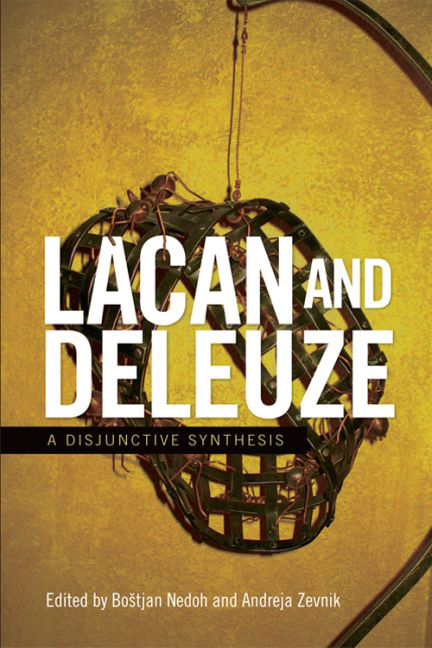Book contents
- Frontmatter
- Contents
- Acknowledgements
- Introduction: On a Disjunctive Synthesis between Lacan and Deleuze
- 1 For Another Lacan-Deleuze Encounter
- 2 Reciprocal Portrait of Jacques Lacan in Gilles Deleuze
- 3 Does the Body without Organs Have Any Sex at All? Lacan and Deleuze on Perversion and Sexual Difference
- 4 Gnomonology: Deleuze's Phobias and the Line of Flight between Speech and the Body
- 5 Lacan, Deleuze and the Politics of the Face
- 6 Denkwunderkeiten: On Deleuze, Schreber and Freud
- 7 Snark, Jabberwock, Poord'jeli: Deleuze and the Lacanian School on the Names-of-the-Father
- 8 Baroque Structuralism: Deleuze, Lacan and the Critique of Linguistics
- 9 Exalted Obscenity and the Lawyer of God: Lacan, Deleuze and the Baroque
- 10 The Death Drive
- 11 Repetition and Difference: Žižek, Deleuze and Lacanian Drives
- 12 Lacan, Deleuze and the Consequences of Formalism
- Notes on Contributors
- Index
5 - Lacan, Deleuze and the Politics of the Face
Published online by Cambridge University Press: 20 April 2017
- Frontmatter
- Contents
- Acknowledgements
- Introduction: On a Disjunctive Synthesis between Lacan and Deleuze
- 1 For Another Lacan-Deleuze Encounter
- 2 Reciprocal Portrait of Jacques Lacan in Gilles Deleuze
- 3 Does the Body without Organs Have Any Sex at All? Lacan and Deleuze on Perversion and Sexual Difference
- 4 Gnomonology: Deleuze's Phobias and the Line of Flight between Speech and the Body
- 5 Lacan, Deleuze and the Politics of the Face
- 6 Denkwunderkeiten: On Deleuze, Schreber and Freud
- 7 Snark, Jabberwock, Poord'jeli: Deleuze and the Lacanian School on the Names-of-the-Father
- 8 Baroque Structuralism: Deleuze, Lacan and the Critique of Linguistics
- 9 Exalted Obscenity and the Lawyer of God: Lacan, Deleuze and the Baroque
- 10 The Death Drive
- 11 Repetition and Difference: Žižek, Deleuze and Lacanian Drives
- 12 Lacan, Deleuze and the Consequences of Formalism
- Notes on Contributors
- Index
Summary
In Cinema 1 Deleuze perhaps most poignantly writes about the face. He states that: ‘There are two sorts of questions, which we can put to a face […]: what are you thinking about? Or what is bothering you, what is the matter with you, what do you sense or feel?’ The two questions suggest a somewhat curious expectation one inherently assumes when ‘faced’ with the face. It implies that the face actualises or hides a particular thought or that it expresses a range of feelings, emotions and thus testifies to the general state of the person. In other words, it materialises or acknowledges the presence of something that otherwise might have remained ungraspable. Maurice Merleau-Ponty captures this peculiar face-function well when he writes: ‘if we make the thought appear in the infrastructure of vision, this is only in virtue of the uncontested evidence that one must see or feel in some way in order to think’. Thus the face is bursting with meaning; but as I argue elsewhere, the particular meaning or face function depends on the scopic field in which the face is made to appear. Making sense of the face has thus become a preoccupation of modern politics and, if the face is a face of the subject, making it appear beautiful a preoccupation of the cosmetics industry. Only when the face is placed within the discourses of visibility, can the knowledge about the subject a face is to represent be revealed. In the realm of the visible a face features as an image that is unique to the subject it belongs to. It is to reveal, expose, tell something about that subject, and it is a ‘turn towards’ the face that will enable this knowledge transmission.
Deleuze, however, aims to disturb such a comprehension of the face and with it macro and micro practices ordering it; his philosophy strives to rescue the face from the terror of signification and subjectivisation. He allocates agency in the face when he writes:
Sometimes the face thinks about something, is fixed on to an object, and this is the sense of admiration and astonishment that the English word wonder has preserved. In so far as it thinks about something, the face has value above all through its surrounding outline, its reflecting unity which raises all the parts to itself.
- Type
- Chapter
- Information
- Lacan and DeleuzeA Disjunctive Synthesis, pp. 74 - 92Publisher: Edinburgh University PressPrint publication year: 2017



